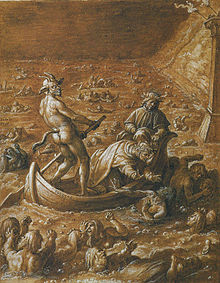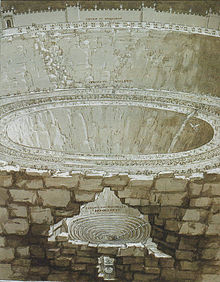Fifth Circle (Anger)[edit]
In the swampy waters of the river Styx, the wrathful fight each other on the surface, and the sullen lie gurgling beneath the water, withdrawn "into a black sulkiness which can find no joy in God or man or the universe."[20] Phlegyas reluctantly transports Dante and Virgil across the Styx in his skiff. On the way they are accosted by Filippo Argenti, a Black Guelph from a prominent family. When Dante was forced to leave Florence, Argenti took all his property. When Dante responds "In weeping and in grieving, accursed spirit, may you long remain,"[21] Virgil blesses him. Literally, this reflects the fact that souls in Hell are eternally fixed in the state they have chosen, but allegorically, it reflects Dante's beginning awareness of his own sin[22] (Cantos VII and VIII). Just as Argenti seized Dante's property, he himself is "seized" by all the other wrathful souls.
The lower parts of Hell are contained within the walls of the city of Dis, which is itself surrounded by the Stygian marsh. Punished within Dis are active (rather than passive) sins. The walls of Dis are guarded by fallen angels. Virgil is unable to convince them to let Dante and him enter, and Dante is threatened by the Furies(consisting of Alecto, Megaera, and Tisiphone) and Medusa. An angel sent from Heaven secures entry for the poets, opening the gate by touching it with a wand, and rebukes those who opposed Dante. Allegorically, this reveals the fact that the poem is beginning to deal with sins that philosophy and humanism cannot fully understand. Virgil also mentions to Dante how Erichtho sent him down to the lowest circle of Hell to bring back a spirit from there (Cantos VIII and IX).[22]
 |
| From wiki common Blake Dante Hell IX.jpg Dis (Divine Comedy)
From Wikipedia, the free encyclopedia
In Dante Alighieri's The Divine Comedy, the City of Dis (in Italian, la città ch'ha nome Dite, "the city whose name is Dis")[1]encompasses the sixth through the ninth circles of Hell.[2]
In ancient Roman mythology, Dis Pater ("Father Dis") is the ruler of the underworld and is named as such in the sixth book of Virgil's "Aeneid", one of the principal influences on Dante in his depiction of Hell (the god was also known as Pluto, a name not used by Virgil in the Aeneid). The hero Aeneas enters the "desolate halls and vacant realm of Dis"[3] with his guide, the Sibyl, who correspond in The Divine Comedy to "Dante" as the speaker of the poem and his guide, Virgil.
Description[edit]
The walls of Dis are guarded by fallen angels and the Furies. Dante emphasizes the character of the place as a city by describing its architectural features: towers, gates, walls, ramparts, bridges, and moats. It is thus an antithesis to the heavenly city, as for instance described by St. Augustine in his City of God.[4] Among these structures are mosques, "the worship places of the most dangerous enemies of medieval Christendom."[5] In Dante's schematics of Hell, some Muslimsand Jews are placed among the heretics. The presence of mosques probably also recalls the reality of Jerusalem in Dante's own time, where gilded domes dominated the skyline.[6]
Punished within Dis are those whose lives were marked by active (rather than passive) sins: heretics, murderers, suicides, blasphemers, usurpers, sodomites, panderers, seducers, flatterers, Simoniacs, sorcerers, barrators, hypocrites, thieves, false counsellors, schismatics, falsifiers and traitors. Sinners unable to control their passions offend God less than these, whose lives were driven by malizia ("malice, wicked intent"):
There is perhaps a distinction between malizia as the characteristic of circles seven and eight, and the matta bestialitade, "inhuman wickedness," of circle nine, which punishes those who threaten "the most basic civic, familial, and religious foundations of happiness."[8]
|


No comments:
Post a Comment